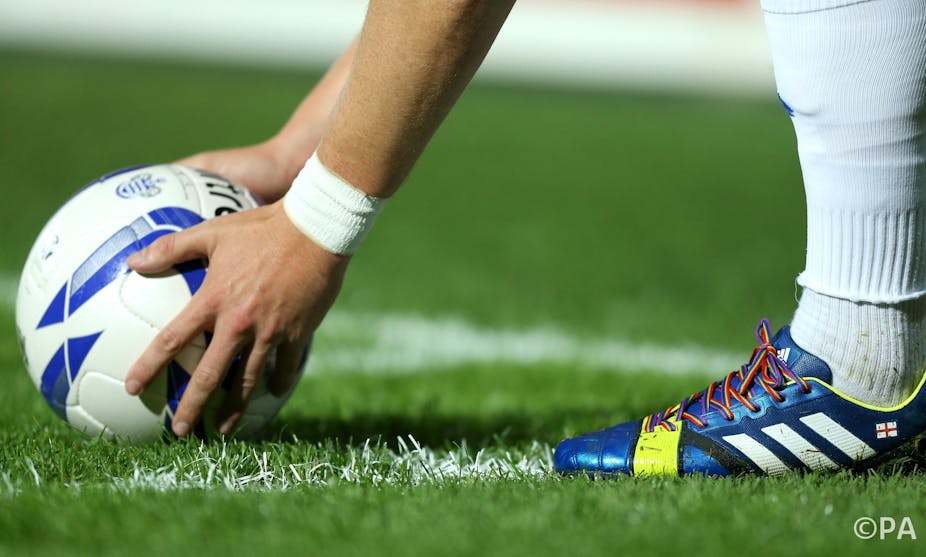Last week, world football was shocked by a match-fixing scandal that swallowed a minor league Australian club and cast it into a world of international betting intrigue. As allegations were levelled at players from Victoria’s Southern Stars team, match-fixing authority Declan Hill breathlessly described how international betting syndicates can affect almost any match, anywhere in the world.
Fans in the UK might comfort themselves that such things can only happen in far flung places, under the global media’s radar. But this weekend, one of the more subtle influences that gambling is having on football was played out.
The Rainbow Lace initiative is a campaign to have star players show their support for gay colleagues, by wearing rainbow-coloured bootstraps. Though high profile teams uniformly supported the sentiment, most of them opted out of the campaign. Their problem was that the drive, organised by gay rights organisation Stonewall, was sponsored by betting firm Paddy Power.
Controversies concerning the betting firm’s representation of transgendered people in their advertising were cited as an issue. Others demurred on the conviction that cultural and commercial messages shouldn’t mix. The case was made that Stonewall should have dealt directly with the clubs and the football league, rather than acting through their controversial sponsor.
However, perhaps the most telling response came from Norwich City FC. According to The Guardian, the Canaries worried, among other things, that participating would compromise the club’s commercial relationship with Paddy Power rivals Sbobet. Sbobet are Norwich’s “official Asian betting partner”, and they feature in pitchside advertising during live games.
The incident shows that match fixing isn’t the only way that gambling affects the football results. The collapse of the Rainbow Lace initiative shows that televised sport is just like any media drama. Commercial sponsorship - in this case betting - determines the people and stories that supporters get to see. This, in turn affects what football says about society; who we see, and who we don’t.
We always hear that football is a results business. That’s not true. It’s a story business. And its pleasure lies in a peculiar narrative device; the enigma.
If you want to understand why people like the game, don’t ask fans or pundits; read French theorist Roland Barthes. Barthes wrote that the best part of the story is the bit in the middle; the long, blissful period of suspense, where we wonder how things will play out, and enjoy toying with the possibilities. He called this the enigma.
It’s the same with football. Most of us support teams who never win anything. All of our pleasure lies in our own ritualistic enigmas - the days before the weekend where we voraciously read message boards and newspapers, watch TV and listen to the radio, all looking for clues about why things just might be different this week. Or at least looking for an explanation as to why they won’t be. Who hates whom in the dressing room? Sometimes we get so caught up with personalities that things like pre-match handshakes (or lack thereof) are more keenly anticipated than the game itself - and more remembered than results.
In this sense, the Southern Stars betting scandal makes perfect sense. It’s a ripping yarn that turned an otherwise nondescript competition into something interesting.
However, most commercial stories aren’t very enigmatic. They seek to amuse, distract and above all, avoid offence. They show a bland world where nothing ever changes, because change is challenging, and challenging ideas can alienate paying audiences.
From the look of the weekend’s news, it seems the limitations of commercial storytelling - the sponsor-pleasing dramas that clubs must stage - is one of the factors behind the failure of the Stonewall push.
That leaves punters shortchanged. Research shows that football fans want action on homophobia. They’ve accused the professional game of shying away from the issue. In fact, the situation might be much worse.
Some fans blame the FA for not doing enough. But in the Rainbow Lace debacle, the opinion of the game’s governing body seems irrelevant. The story suggests something much more troubling; the commercial relationships that produce the Premier League as a globally admired spectacle radically limit its capacity to embrace diversity.
For a long time, anti-homophobia campaigns suffered from the perception that supporters weren’t ready for change. Now we know they are. Today, at least a part of the problem is that clubs aren’t willing to gamble with the commercial clout of betting firms. You can bet that’s a trend that will be hard to shift.

